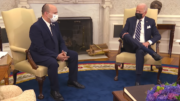The events related to the issue of Iran’s nuclear deal seems to have accelerated with Macron’s visit to the United States and his talks with the US president and other officials. Here are some of the news, indicating the atmosphere of the negotiations.
According to Reuters On Tuesday, April 24th, the US president said, “Macron and I will soon reach an agreement on Iran’s nuclear deal.” “We can at least be able to reach agreement quickly between ourselves, “Trump said, “I think we are close to a common understanding of each other,” he added.
“What I can say is that we had a very explicit discussion,” Macron said. And Reuters concluded that the two sides stand on their own positions. On the other hand, the New York Post on April24, wrote that Tramp should make it clear to Macron that if US sanctions return, it would be part of a more comprehensive strategy of putting pressure on Iran’s regime with fundamental impacts. In that case, European are supposed to make a difficult decision on preference relations with Iran or the US, although the answer is predictable.
The presidents actually represent the stances of the EU and the USA, which are not completely consonant.
On Tuesday, April 24 at a joint press conference Macron said:
“We, therefore, wish, from now on, to work on a new deal with Iran. What we need — and I believe that on that, our discussions allowed us to shed light on our convergence of views — is that we need to cover four topics.
The first one is to block any nuclear activity of Iran until 2025. This was feasible thanks to the JCPOA. The second is to make sure that, in the long run, there is no nuclear Iranian activity. The third fundamental topic is to be able to put an end to the ballistic activities of Iran in the region. And the fourth one is to generate the conditions for a solution — a political solution to contain Iran in the region — in Yemen, in Syria, in Iraq, and in Lebanon.”
Donald Tramp, without talking about the US remaining in the nuclear agreement in future, said: “We will see if a new agreement can be based on solid principles or not?”
Because this deal is grounded in decay, it is a bad deal (Joint Comprehensive Plan of Action (JCPOA)), it is collapsing and should never be done.”
Meanwhile, none of the two solutions, proposed in Washington, is desirable for the Iranian regime. The meaning of the US threats to the regime is very clear: collapsing of the nuclear deal, whose consequences’ lead to the crippling sanctions.
President Macron’s plan is either painful or even deadly for the regime. Because it aims at “containing” the Iranian regime, as was mentioned above. Iranian regime acceptance these conditions means drinking the “chalice of poison”. It had been much better for them to accept the conditions while Jean-Yves Le Drian carried the message to Tehran. In that case, the EU, particularly Paris, would enjoy a relatively upper hand during the negotiation with the US.
But the reality is that accepting such great demands for the Mullahs’ regime is difficult. So, the Iranian regime is really stuck in an unfortunate choice between bad and worse. The Regime’s tough situation is mirrored in the rival factions inside Iran. Two MPs of Khamenei’s faction blasted Rouhani, asking: “What is the reason for the frequent withdrawing against the aliens, insulting and humiliating the revolutionary and Supervisory institutions of the country”?
In a more intense reaction, Kayhan newspaper affiliated to Khamenei April 25, wrote: “Unfortunately, Mr. Zarif, with a passive stance, expressed statements contrary to national interests، Declarations that show no sign of diplomatic behavior.”
In response to Zarif, who had said that “We should look for a powerful region, not to be the strongest in the region,” within the same article, Kayhan wrote, “Mr. Zarif! Be a Diplomat, you are exempt to be a revolutionary!”
The idea of a “powerful region instead of regional power” is, in fact, akin the nuclear agreement with the 5+1 powers that inside the regime is considered as “drinking from the chalice of poison.”
In other words, (JCPOA) number 2, 3… Which means abandoning the expansionism policy of Mullahs’ in the region, the ending the support of regional affiliated terrorist groups, like Lebanese Hezbollah and Yemenis Houthis, and also stopping backing the criminal regime in Syria, Bashar Al-Assad, and entering direct dialogs with the regional states, while the mullahs have been vacated from all their winning cards.
The decision that the Iranian regime makes is not announced yet. The continuation of Khamenei’s silence on (JCPOA) is a proof of the hard condition he is engulfed in it. Over the next few weeks, he must make his decision that will be a choice between ‘bad’ and ‘worse’.
Source iranfreedom.org
By Mahdavi Nasim
Mahdavi is an Author, Reporter, and Opposition Activist to the Iranian regime. He writes articles for http://www.iranfreedom.org/en/. You can follow him on Twitter @mahdavi85



Be the first to comment at "The Iranian regime on the horns of a dilemma to rescue the nuclear deal"